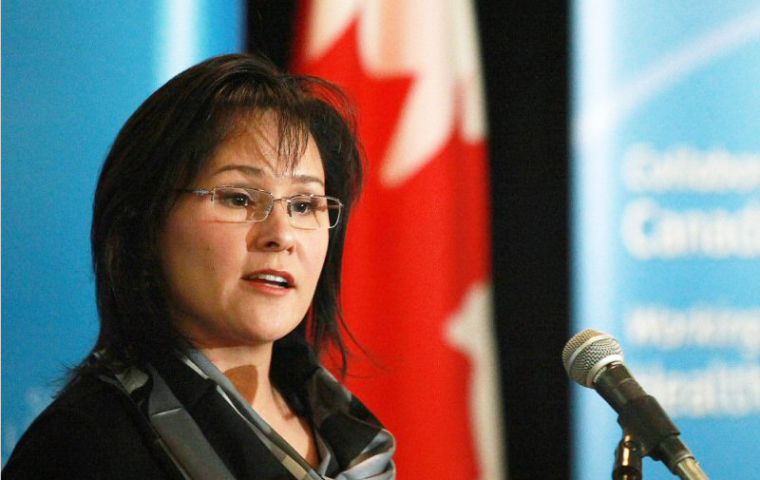MercoPress. South Atlantic News Agency
The Arctic eight-member Council has accepted China and India as ‘observer states’
 Canada Health Minister Leona Aglukkaq started a two-year mandate as chair of the council
Canada Health Minister Leona Aglukkaq started a two-year mandate as chair of the council New emerging powers including China and India have been accepted as “observer” states in the eight-nation Arctic Council and a new deal was signed to improve oil spill response to safeguard the fragile eco-system of the region, as Canada begun its chairmanship.
The legally-binding cooperation deal is aimed at improving procedures in response to oil spills.
Canada Health Minister Leona Aglukkaq, who started a two-year mandate as chair of the council, said Ottawa is also launching marine pollution prevention work as part of efforts to mitigating impacts in the Arctic region.
“A lot of work went into that,” Aglukkaq said in a conference call from the council meeting in Kiruna, Sweden.
“It's the first binding agreement of this nature in the Arctic region and we'll be building on that on the prevention side in the next two years.”
“Research gaps” regarding oil spills in the Arctic is an area of great concern to Canada, which has been stressing the importance of international cooperation.
The Arctic Council was set up in the 1990s and has been mainly concerned with environmental matters including climate change and pollution, both of which are being felt more heavily in the Northern regions
It has eight permanent members made up of the five coastal Arctic countries -Norway, Russia, Canada, US and Denmark. The council also includes three other non coastal members, Finland, Iceland and Sweden.
While six European countries are permanent observers, the Council has so far not agreed to grant same status to the European Union. It is believed that Canada, which has now assumed the chairmanship of the Council, was strongly opposed to the EU getting a permanent observer seat.
The Council said that the application of the EU for observer status was received affirmatively, but it deferred a final decision until the concerns of members are resolved.
It is believed that negotiations are now ongoing over the seal fur issue between the Council and the European Commission.
Now the Council has accepted some of the world's most important emerging powers into what has been dubbed the “coldrush club”, a name that reflects the opportunities many see for the exploitation of oil and gas resources in the region.
Up to 13% of the world's undiscovered oil reserves, and 30 per cent of undiscovered gas deposits are said to lie above the Arctic Circle.
The new observers will have no voting rights and must also confirm they will not challenge the ownership of the five Arctic coastal states.
The meeting in Kiruna has agreed on a new manual that will govern the activities and roles of the observers. They will not be able to directly raise issues but will have to bring them forward through one of the eight core members.




Top Comments
Disclaimer & comment rules-

-

-

Read all commentsThe last thing the article needs is the EU screwing it up!
May 17th, 2013 - 07:57 am 0I belive they are only observers and have no powers..
May 17th, 2013 - 09:44 am 0Stick with it, Canada. Historically, it should be noted that the EU screws up anything in which it gets involved. Also, it will all cost ten times as much. Whatever you do, keep the EU out of it. The Arctic Council has all the members it needs. Although what connection India has with the Arctic is hard to see.
May 17th, 2013 - 11:56 am 0Commenting for this story is now closed.
If you have a Facebook account, become a fan and comment on our Facebook Page!